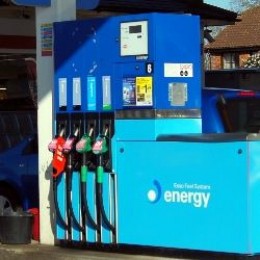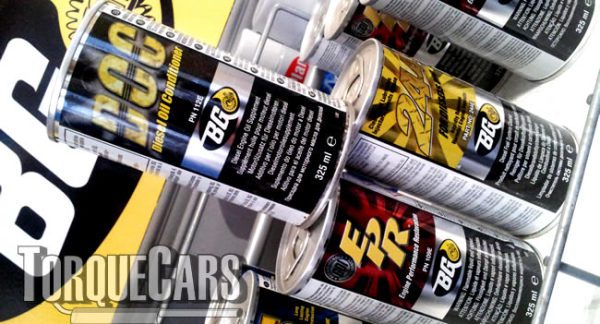The 5 best ways to save fuel.
"Don't waste fuel by following our top tips."
With ever increasing fuel costs it makes sense to look for ways to save fuel. The more fuel you conserve the more money you will save.

We'll take a look at the best fuel saving tips and blow a few myths out of the water.
If everyone who read these tips just managed to save 1 mpg it would add up to a massive fuel saving and help the environment.
In reality I think most people will save about 10-20% in fuel costs by reading and applying these tips. To keep track of your MPG use an online fuel calculator.
1 General servicing
The following things can really affect your fuel consumption.
Servicing - a regularly serviced and well maintained car will be more efficient and use less fuel. Pay particular attention to oil levels, spark plug condition and air filters to save fuel.
Tire pressures - having soft tires or slow punctures can cost as much as 4 mpg, which adds up over time. Most drivers report better fuel economy at the higher end of tire pressures but this needs to be balanced with the vehicle load, use and manufacturers recommendations.

Wheel alignment - if the wheels are out of alignment or you have a high friction hub issue you will be losing substantial amounts of fuel economy.
Running the engine hot - a warm engine is more efficient. Some drivers change the thermostat for a hotter one and will usually gain a few addition MPG and save some fuel.
2 Avoid modifications to the engine that do nothing to help you save fuel.
There are a number of products out there claiming to give you extra fuel economy but most are downright fraudulent or at best so negligibly effective at saving fuel they are not worth it.
Magnets on the fuel line do nothing, fuel does not magnetize ionize or similar as claimed by the makers of these fuel magnets. Most are very weak magnets that clip on the fuel line. You could try taping a fridge magnet to your fuel line and see for yourself how effective this is rather than shell out on a "miracle fuel saving magnet".
Oil additives that bond to the engine. There are so many of these around on the market. Most of the particles will get caught in the fuel filter anyway potentially clogging it up. There is very little evidence to support any oil additives and less so to support the fact they help with saving fuel. There is no substitute for getting a good quality engine oil in the first place and keeping it topped up.
Water to Hydrogen kits, we are constantly asked about these kits and if they save fuel and the answer is NO! Leave them well alone. If it were that easy to run a car on water and save fuel the manufacturers would have done it. Most of the companies selling these devices have amended their claims following complaints from the advertising standards. Perhaps one day someone will come up with a system that actually works but for now this is just a pipe dream.
3 Beneficial additives and tuning methods to save fuel.
Remapping an engine, chip tuning and SOME smart tuning boxes will increase your fuel economy. This needs to be specified when buying, as most will increase performance and fuel consumption. It is worth noting that most diesel engines tuned/remapped for performance will also return a better fuel economy figure as they are working more efficiently.
Fuel saving tires also work. They reduce the rolling resistance so you have to expect slightly less grip from them in some conditions but they can knock a few more MPG out of a tank.
 Petrol additives that help burn off carbon deposits can work really well!
Petrol additives that help burn off carbon deposits can work really well!
I personally rate BG44K for petrol engines, & BG244 for diesels, it really does help a car burn off carbon and makes the engine run more efficiently.
Conversion to LPG fuel usually means a large fuel saving. In the UK LPG duty is substantially lower than petrol. Conversion is relatively simple and providing you have access to LPG fuel and the price of this is low you are in a win/win situation. (LPG conversions are not necessarily legal in all states/countries and fuel prices do vary.) You'll also burn slightly more LPG fuel than petrol as it has a lower calorific value but the low price more than offsets this difference.
4 Driving tips
Driving style has the single biggest impact on your fuel economy. Changing the way you drive will save fuel.
Try to accelerate slowly, avoid braking and allow the car to slow up naturally as you approach junctions and stop signs. Heavy braking and accelerating are the enemy of fuel economy.
The amount of fuel used is directly related to how much the accelerator is pushed. You will get around 80% of your engines performance at just 40-50% of throttle at low RPM. Pushing harder just potentially wastes fuel.
Avoid stops altogether. If you can keep the car rolling at all times you will save the extra fuel needed to push against inertia.
Turn off the engine. Newer cars are fitted with stop start engines that automatically do this in traffic. There is no reason why you can't switch off your engine rather than letting it idle. In urban driving this can make a big difference to fuel consumption. All the little bits of fuel you save will quickly add up over time.
Drive more slowly, pushing over the highway speed limits will use significantly more fuel and only make a minor reduction to the journey time. Aim to cruise at 60 mph instead of 80 and see a 20-40% gain in your fuel economy. Driving at 80mph wastes a lot more fuel than you would use at 70, going at 60 sees a major gain.
Avoid short journeys. All short journeys use a lot more fuel than longer ones as fuel is wasted trying to get the engine to warm up. You are better off combining all of your short trips into one day and running a warm engine or better still walk instead of using the car over short distances.
Newer diesel engines are much much cleaner, they have better fuel management, and pollution reduction measures but lots of short journeys can lead to clogging up of the DPF (Diesel particulate filter). See our guide on how to clean a DPF for more info.
Pass on your tips for saving fuel and driving economically and give your opinions on fuel saving devices.
5 Choosing Fuel, Oil and Tires carefully
Fuel choice can make a difference to your economy. On most modern engines, particularly performance engines you will get more MPG from the Higher Octane fuels. In most cases the extra cost of the fuel makes up for the saving but you'll also benefit from more power.
Converting a petrol car to run on LPG can cut around 33% from your annual fuel costs. The only downside is the cost of the conversion which takes most people 1 year to recoup and having to find a fuel station which sells LPG.
Putting low quality oil in can also dramatically increase engine wear. Not all oils are equal, the numbers and ratings of oil only tell part of the story. I have noticed an instant improvement in mpg just by topping up a low oil level to the correct level.

Different tires have differing rolling resistance, choose fuel saving tires with a low rolling resistance and the fuel savings will add up over the life of the car.
Must you keep a roof rack on the car, the extra drag this creates makes a noticeable difference to your fuel economy. Driving around with open windows at high speed will also create unnecessary drag.
Please Check out my YouTube channel, we're regularly adding new content...
PLEASE HELP: I NEED YOUR DONATIONS TO COVER THE COSTS OF RUNNING THIS SITE AND KEEP IT RUNNING. I do not charge you to access this website and it saves most TorqueCars readers $100's each year - but we are NON PROFIT and not even covering our costs. To keep us running PLEASE Donate here
If you liked this page please share it with your friends, drop a link to it in your favourite forum or use the bookmarking options to save it to your social media profile.
Feedback - What do You Think?
Please use our forums if you wish to ask a tuning question, and please note we do not sell parts or services, we are just an online magazine.
Help us improve, leave a suggestion or tip
Please watch this video and subscribe to my YouTube channel.
One Response to “5 top fuel saving tips”

 Click to accept YouTube Cookies & Play.
Click to accept YouTube Cookies & Play.
Use your cruise control when possible